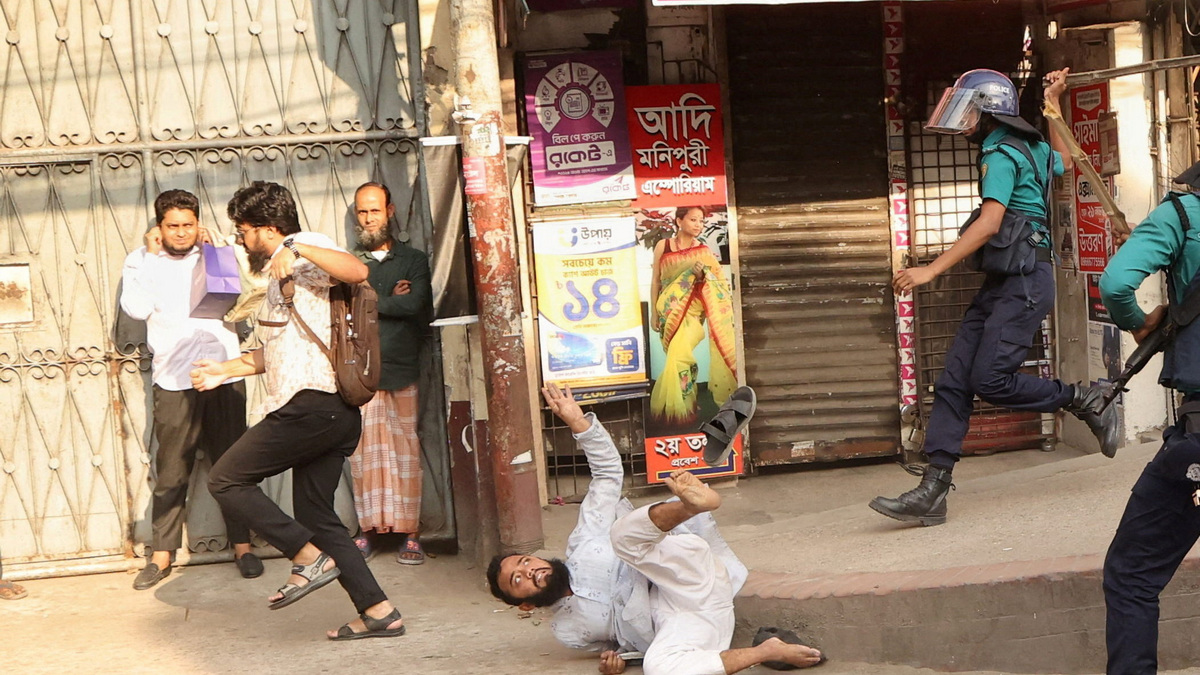Sheikh Hasina has been sentenced to death.
Bangladesh’s former long-time Prime Minister was given the death sentence after being found guilty of crimes against humanity. The months-long trial, which was conducted in absentia, comes ahead of next year’s polls in Bangladesh.
Hasina had fled to India, where she remains, after the fall of her regime in August 2024. The verdict by the three judges from Dhaka’s International Crimes Tribunal, Bangladesh’s war crimes court, was greeted by rounds of applause from the friends and family members of victims who died in the crackdown.
The 78-year-old supremo of the now-defunct Awami League has denounced the verdict as ‘biased and politically motivated’. The verdicts announced against me have been made by a rigged tribunal established and presided over by an unelected government with no democratic mandate," Hasina said in a statement.
The verdict can be appealed in the Bangladesh Supreme Court. However, according to reports, Hasina cannot appeal the verdict unless she is arrested within 30 days or returns to Bangladesh.
But what is the situation inside Dhaka, which saw crude bomb explosions, arson incidents and detentions last week?
Let’s take a closer look
The situation in Dhaka
The situation in Dhaka, which witnessed a series of crude bomb explosions on Sunday ahead of the verdict, remained tense on Monday. The national capital of Bangladesh witnessed heavy deployment of soldiers, paramilitary border guards and police.
Traffic in Dhaka vanished, markets remained shut, and intersections witnessed heavy security presence. Hasina’s Awami League had called a nationwide shutdown to protest the verdict. Armoured carriers, water cannons and Rapid Action Battalion units were stationed at important junctions.
Security forces patrolled sensitive and high-profile areas in Dhaka including the tribunal complex, the Secretariat, the Supreme Court, the Prime Minister’s Office and the diplomatic enclave.
Dhaka Metropolitan Police Commissioner SM Sazzat Ali said officers had been authorised to fire on violent protesters with live ammunition. Ali told the troops that anyone attempting to torch buses or hurl crude bombs with an intent to kill “should be shot”.
“I have asked to protect life and property. Those who set fire to cars and policemen with cocktails, and those who throw cocktails at vehicles, have been legally ordered to be shot,” he told Dhaka Tribune.
As per local reports, some college students tried to bring bulldozers to Dhanmondi 32, the historic residence of Sheikh Mujibur Rahman, the founder of Bangladesh and the father of Hasina. This resulted in police and army personnel taking steps to disperse the crowd.
Authorities stepped in after a group tried to block the bulldozers brought by students from Dhaka college. Police fired sound grenades to disperse the mob.
Abdul Kaiyum, operations officer of Dhanmondi police station, told Dhaka Tribune, “Students of Dhaka College have brought two bulldozers to Dhanmondi 32. They are announcing over loudspeakers that they will demolish the Dhanmondi 32 house after the verdict is delivered." The group was halted on the main road and denied access to the area before being pushed back.
There were incidents of sporadic violence in the city. Protesters burnt tree trunks and tyres to block roads, while multiple crude bomb blasts rattled neighbourhoods in Dhaka. Several groups linked to the July Uprising gathered outside the International Crimes Tribunal-Bangladesh (ICT-BD) complex in the morning, chanting slogans and demanding justice.
Authorities have insisted they are prepared for any trouble after the verdict, with patrols, rooftop surveillance, checkpoints, and movement controls implemented in several areas. The order came as nearly 50 arson attacks, mostly targeting vehicles, and dozens of explosions of crude bombs have been reported across Bangladesh over the past week, including at several intersections across Dhaka and one in front of the house of an adviser, equivalent to a Cabinet minister.
Two people were killed in the arson attacks , as per local media. Police had said people on bikes threw several Molotov cocktails, which exploded.
Authorities at the Supreme Court, in a letter to army headquarters on Sunday, requested the deployment of soldiers around the tribunal premises ahead of the verdict.
Hasina’s son and adviser, Sajeeb Wazed , said on the eve of the verdict that they would not appeal unless a democratically elected government took office with the Awami League’s participation.
What prosecutors claimed
During the trial, prosecutors told the court that they had uncovered evidence of her direct command to use lethal force to suppress a student-led uprising in July and August 2024.
According to a United Nations report, up to 1,400 people may have been killed during the protests between 15 July and 5 August 2024, with thousands more injured — most of them by gunfire from security forces — in what was the worst violence in Bangladesh since its 1971 war of independence.
Hasina was represented by a state-appointed defence counsel who told the court that the charges against her were baseless and pleaded for her acquittal.
Ahead of the verdict, Hasina dismissed the accusations and the fairness of the Tribunal proceedings, asserting a guilty verdict was “a foregone conclusion.”
Bangladesh has been tense ahead of the verdict, with at least 30 crude bomb explosions and 26 vehicles torched across the country over the past few days. There have been no casualties, however.
Hasina, 78, who has remained in India since she was overthrown in August 2024, challenged the legitimacy of the Tribunal in an email interview last month.
“These proceedings are a politically motivated charade,” she said. “They have been brought by kangaroo courts, with guilty verdicts a foregone conclusion. They are presided over by an unelected government which consists of my political opponents.”
She also said she was denied adequate notice of the hearings and any meaningful opportunity to mount a defence, adding that she was not personally involved in the use of lethal force or other alleged crimes_._
With inputs from agencies
)